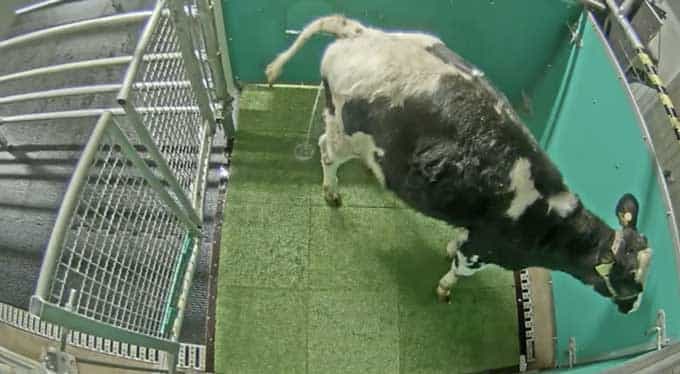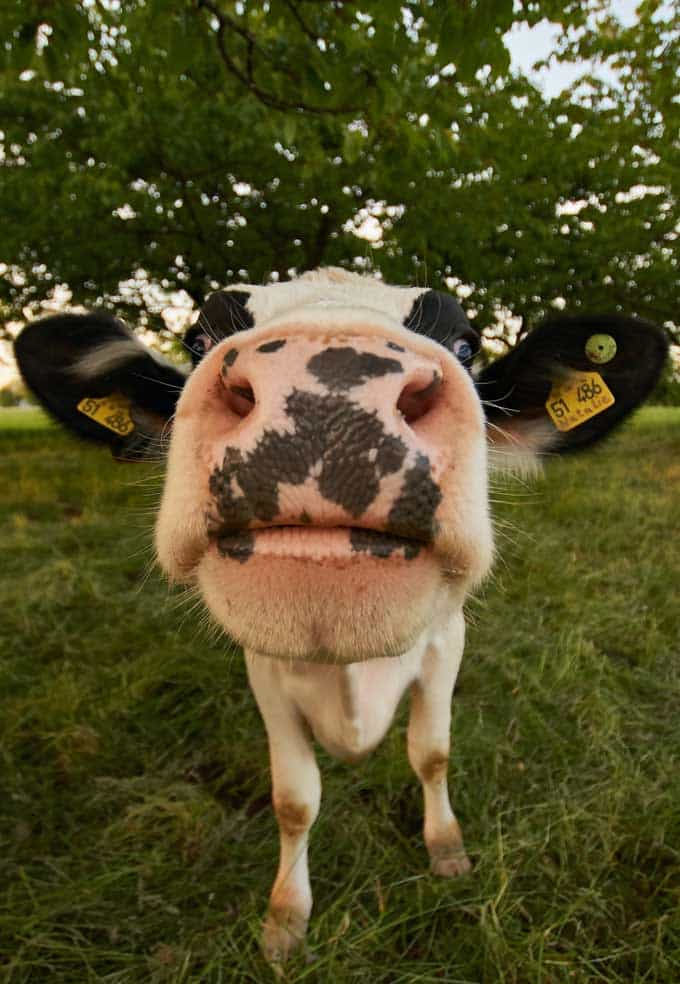Scientists are instructing cows to urinate in specified areas, facilitating the collection and neutralization of urine to significantly decrease methane emissions.
In a quirky quest to address climate change, a team of scientists in Dummerstorf, Germany, has embarked on an unconventional mission: potty training cows. Termed ‘learned control of urinary reflexes,’ this unexpected approach is being hailed as an innovative and previously unexplored strategy in the battle against global warming.
The peculiar experiment, detailed in a September publication in the scientific journal Cell Biology, involved 16 cows undergoing potty training sessions. Picture this: a two-by-two-meter pen dubbed the ‘MooLoo,’ where cows were encouraged to do their business. A successful attempt triggered a hatch to open, dispensing a sweet electrolyte liquid – a reward reminiscent of robotic milking systems. However, for those who missed the target, a mild punishment ensued: a brisk three-second squirt of cold water. The collected urine was then subjected to treatment and neutralization.
As the experiment progressed, the cows were gradually relocated farther from the MooLoo, upping the ante on their bathroom commute. Diuretics were even introduced to stimulate more frequent urination, adhering to ethical guidelines on experiment duration.
Surprisingly, after just 15 sessions lasting 45 minutes each, conducted over a span of two weeks, the results were remarkable. Eleven out of the 16 cows showcased successful toilet training, with an impressive 80 percent of their urination occurring within the confines of the MooLoo.
Dr. Jan Langbein of FBN, a veteran in the study of farm animal cognitive abilities, expressed amazement at the outcome, stating, ‘While other animals like cats, dogs, and pigs are toilet trained, the idea was that cattle weren’t capable of this.’ A small pee for cows, perhaps, but a giant leap in the quirky crusade against climate change.

One small pee for cows, one giant leap for mankind. At least, that’s what a team of scientists in Dummerstorf, Germany, believe could be a potent solution for manmade climate change.
While grand experiments around the world are being tested to prevent disastrous global warming, including giant machines sucking up CO2 and large-scale seagrass restoration, the researchers from the University of Auckland and Germany’s Research Institute for Farm Animal Biology (FBN) say that potty training — or as they term it, “learned control of urinary reflexes” — is an “original and hitherto unrealized opportunity” in the fight against global warming.
During the study, the findings of which were published in the scientific journal Cell Biology in September, the team carried out potty training for 16 cows.
A two-by-two-meter pen acted as a designated toilet. Each time one of the young calves entered the so-called “MooLoo” and urinated, within a minute they were given a reward: a hatch opened up to offer them a sweet, electrolyte liquid (the same system used for robotic milking).
But if they urinated outside the MooLoo, they were given a mild punishment: a three-second squirt of cold water (any longer and the cows began to enjoy it). Their urine was then collected, treated, and neutralized.
As the training progressed, the cows were moved further and further from the toilet, increasing the effort required. Diuretics were given to the cattle to get them to urinate more because of the limited time to run the experiments under ethics guidelines.
After 15 sessions of just 45 minutes each, carried out over two weeks, researchers found that 11 out of the 16 cows were successfully toilet trained — 80 percent of their urination was done within the MooLoo.
“We were really impressed by the result,” says Dr. Jan Langbein of FBN, who for 20 years has been studying the cognitive abilities of farm animals. “While other animals — cats, dogs, and pigs — are toilet trained. The idea was that cattle weren’t capable of this.”

Broom adds that the research shows that cattle management and feeding systems can be vastly improved to reduce greenhouse gas production and create sustainability. “We’ve underestimated what cattle can learn,” he says. “This is the kind of thing we ought to be trying to do.”
However, Andrew Knight, a veterinary professor of animal welfare at the University of Winchester, has concerns about the plausibility of scaling up MooLoos or similar cattle urine collection systems. While the experiment was carried out on cattle housed in a barn, he says, to do so year round would raise questions about animal welfare.
“So, what happens when they graze outdoors?” he asks. “Will we have to put MooLoos everywhere? You can’t keep them trapped inside all year.”
Professor Knight also argues that geographic and socioeconomic factors would be a serious obstacle in some parts of the world. “The problem is that the MooLoos might not be economically affordable for farmers in poorer countries or simply not geographically practical.”
Nonetheless, Langbein defends the MooLoo, which is set to be tested on a larger scale and under grouped housing conditions next summer.
In countries like New Zealand, where cows spend much of their day grazing in fields, the animals could be trained to only urinate during their twice-daily milking sessions at the barn.
In the U.S., where cattle are often reared in feedlots, this wouldn’t be as much of an issue.
To reduce the burden on farmers, Langbein says that automation is being explored — sensors could be installed at the barn to allow the use of the MooLoo 24 hours a day, for instance.
“We need a low-cost solution that doesn’t require more work from farmers,” he adds.
Bigger picture solutions such as reducing overall livestock numbers and the land area used for livestock are more likely to have the required impact on emissions, according to Knight. But he concedes that the MooLoo could play a part in that effort.
“The amount of greenhouse gases being produced by cows is enormous,” he says. “So even a small percentage could make a significant impact.”
